Lawsuits include those about procedures for certifying elections, which ballots should be counted, and the accuracy of state voter rolls.
The run-up to the 2024 election has seen a number of consequential court cases and rulings related to how voters cast their ballots and how governments process the election results.
Some of the cases remain ongoing, and if 2024 is anything like 2020, the nation could see a flurry of lawsuits after Election Day with candidates also challenging the outcomes.
It is, however, unclear how far any legal case will go, with experts doubting that a Supreme Court case will result from the ongoing slate of legal challenges.
“Judges throughout the country … are loath to be perceived as disenfranchising individuals,” Landmark Legal Vice President of Legal Affairs Mike O’Neill told The Epoch Times.
“If they have an exit ramp to either dismiss a case or a procedural exit ramp to dismiss a case, they’re going to take [it]—even despite the fact that there might be evidence of either some sort of failure to follow proper procedures or failure to follow necessary registration procedures.”
Mail-In or Absentee Ballots
Perhaps the most contentious election issue in 2020 was the widespread use of mail-in ballots, brought on by the government response to the COVID-19 pandemic.
“Because we’re no longer in the COVID situation, we’re not going to see the same level of court-driven outcomes in our elections,” Public Interest Legal Foundation President J. Christian Adams told The Epoch Times. “I think that’s the big difference between now and 2020.”
“Ballots come in, they take quite a bit more processing, making sure that it’s the person who voted to send him in all those things, and so it’s just a slower process,” Honest Elections Project Vice President Chad Ennis told The Epoch Times.
Earlier this month, the state supreme court declined to hear Republicans’ challenge to the state notifying voters of deficiencies in their ballots.
In Nevada and Mississippi, similar challenges surround ballots received after Election Day.
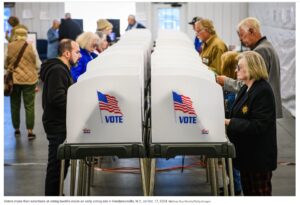
The issue reached the U.S. Court of Appeals for the Fifth Circuit, which heard arguments in September over the Republican National Committee’s (RNC’s) claim that Mississippi should not count those ballots—even if properly postmarked.
More specifically, Judge Xavier Rodriguez blocked Texas from preventing compensation for assisting voters with their mail-in ballots.
He also enjoined a restriction on compensation for vote harvesting services, which the law defined as “in-person interaction with one or more voters, in the physical presence of an official ballot or a ballot voted by mail, intended to deliver votes for a specific candidate or measure.”
Both provisions violated the Voting Rights Act, according to Rodriguez.
In Michigan, North Carolina, and Pennsylvania, Republicans have also filed lawsuits challenging ballots submitted from individuals who are overseas.
A law known as the Uniformed and Overseas Citizens Absentee Voting Act requires states to allow ballots from Americans who live overseas, but Republicans have argued that state officials in North Carolina and Pennsylvania are illegally exempting overseas Americans from verification requirements.
They similarly argued that Michigan officials have registered people who don’t reside in the state.
Certification
Fulton County Superior Court Judge Robert McBurney heard arguments on Oct. 1 over Democrats’ challenge to Georgia state election board policies surrounding certification.
One of the rules requires officials to make a “reasonable inquiry” before certifying the results while another allows officials to review documentation “created during the conduct of elections.”
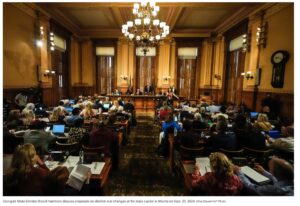
McBurney seemed inclined to uphold the rules but with clarification of the reasonable inquiry rule, which he said was “vague.”
He added that delays in election officials receiving information related to the election was “not a basis for refusing to certify the election results or abstaining from doing so.”
Another ruling by McBurney, on Oct. 15, held that the Georgia election board had acted too closely to an election when it tried to impose a rule requiring ballots be counted by hand.
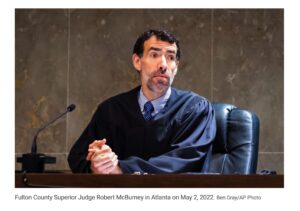
Voter Rolls
The Department of Justice has sued both Alabama and Virginia over their attempts to clean up their state’s voter rolls prior to the election.
Both lawsuits cite something known as the “Quiet Period Provision” of the National Voter Registration Act, which says: “A state shall complete, not later than 90 days prior to the date of a primary or general election for Federal office, any program the purpose of which is to systematically remove the names of ineligible voters from the official lists of eligible voters.”
Multiple disputes over election rolls have emerged in Arizona, where election officials found that nearly 100,000 voters were able to vote despite not providing proof of citizenship.
More recently, a federal judge ruled against an Arizona group’s legal effort to force county officials to investigate ahead of the upcoming general election whether more than 40,000 registered voters are U.S. citizens.
The RNC has raised other allegations about noncitizen voting in Maine as well as Nevada, where the RNC and the Trump campaign sued the secretary of state.
It generally cautions against election policy changes just before voters head to the polls.
The court’s opinion didn’t set out a specific timetable for allowable changes to election procedures. Instead, it reversed an appeals court decision striking down Arizona’s voter ID law.
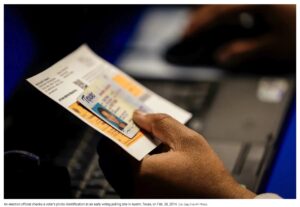
The opinion showed concern about abrupt changes to the law just weeks before an election.
“I think certain courts will invoke Purcell if they want to avoid the perception that they could be disenfranchising [voters],” O’Neill told The Epoch Times.
Convicted felons are another demographic whose ability to vote has been subject to political scrutiny.
Last year, for example, legislation was introduced to guarantee convicted felons can vote in federal elections.
States currently have a patchwork of laws determining whether felons can vote.
The Minnesota Supreme Court similarly rejected in August a challenge to the state’s law allowing felons to vote immediately after their release from prison.
Supreme Court Intervention
The U.S. Supreme Court earlier this year rejected the Colorado Supreme Court’s attempt to hold that former President Donald Trump was disqualified from running for office.
The state supreme court pointed to Section 3 of the 14th Amendment, which broadly prohibits individuals from holding office if they have engaged in an insurrection.
A Supreme Court majority clarified in the case, known as Trump v. Anderson, that states can’t make such a ruling but left open the possibility that Congress could disqualify Trump through its enforcement powers under the 14th Amendment.
Rep. Jamie Raskin (D-Md.), a leading House Democrat, responded in March to the U.S. Supreme Court’s ruling by stating that he was working on legislation to disqualify Trump.
Besides Trump v. Anderson, the last time the U.S. Supreme Court faced such a consequential decision about the presidential election was in 2000 with Bush v. Gore.
Still, as Republicans pursue dozens of legal challenges, some of them might reach the top court. The RNC told The Epoch Times it is involved in more than 130 lawsuits across 26 states.
After the 2020 elections, for example, the Supreme Court received multiple petitions requesting a review of election procedures in the states.
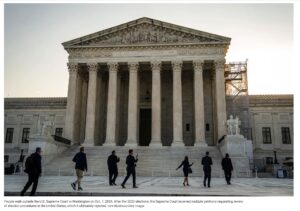
It ultimately rejected them, including one in which the state of Texas challenged results in four battleground states.
Supreme Court Justice Clarence Thomas dissented from the refusal to hear the case and warned about the consequences of an unresponsive court, stating “We failed to settle this dispute before the election, and thus provide clear rules.”
He added, “By doing nothing, we invite further confusion and erosion of voter confidence. Our fellow citizens deserve better and expect more of us.”
Supreme Court Justice Ketanji Brown Jackson indicated in September that the court was anticipating an election-related lawsuit.
O’Neill speculated that “the U.S. Supreme Court has left space on its docket in case they have to rehear any cases on an expedited/emergency basis.”
He added that “if there’s going to be something akin to a Bush v. Gore in 2000 and they’re going to have to determine equal protection questions or due process questions on an expedited basis, I know the court is prepared to do that.”
Experts told The Epoch Times the court will likely refrain from taking a case related to this election as well.
“I think the Supreme Court is highly reluctant to get involved in outcome-determinant election litigation,” Adams told The Epoch Times.
Former Federal Election Commission member Hans von Spakovsky told The Epoch Times the possibility of the Supreme Court taking on a case is “slim.”
“If any lower federal court issues a decision between now and election day that changes any existing rules governing the election process, the only involvement the court would have in any appeal would be to stop that change due to the Purcell doctrine, the court’s rule that changes should not be made by a federal court shortly before an election,” he said.
“Only if there is a major constitutional conflict after the election over the results could I see a case getting to the court and I think the chances of that occurring is also very slim.”
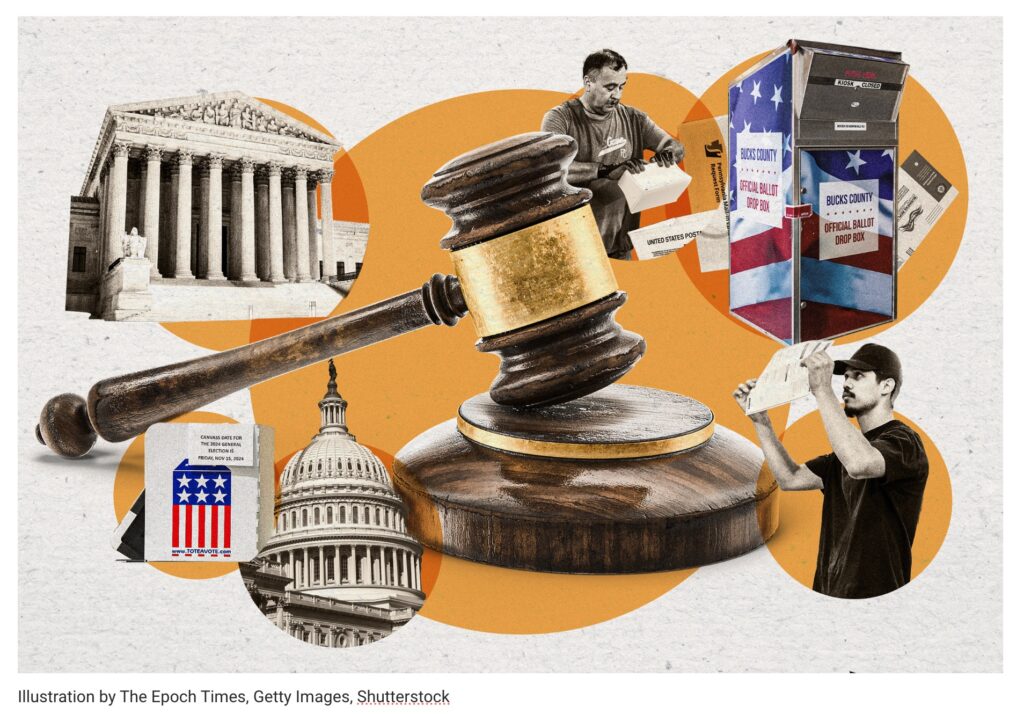





Here’s a perceptive post from Jim Stone:
https://www.voterig.com/.uk3.html
Obvious: Trump leads Kamala by a ratio of 40:1.
We all know who will win, the question is whether or not Kamala will “win”. It appears Trump’s lead over Kamala is even bigger than his lead over Biden was, because Biden at least got around 11 percent of the vote. Kamala probably won’t even get the entire Jewish community because even they might be too embarassed, even in the privacy of a voting booth. Better to have a machine handle that like a shop vac in a chicken coop. Vote early and vote often, and let a little Dominion spice handle the rest. America did not rebel over the theft last time, why not be even more brazen this time?
It seems like Madison Square Garden went well, you mean he’s gonna lose even if he absolutely packed a rally in New York??? I say YEP, unless an AI concludes that the theft is simply too brazen or “David” is too embarrased to vote for her enough times to do the trick.
Significant: Intelligence agencies are expecting a huge cyber attack on or near election day
Remember the warnings just before 911? Same intelligence agencies, and they aided and abetted 911.
FACT: If they are suspecting an attack, they have to know who is planning it, and if they know that, they can stop it. If they cannot stop it, it means THEY did it, because they cannot say they suspect it without knowing who might do it and where.
Great interview
Victor Davis Hanson is a renowned classicist, military historian, and political commentator. He is the Martin and Illie Anderson Senior Fellow in Residence in Classics and Military History at the Hoover Institution, Stanford University. Among numerous other awards, Victor was presented the National Humanities Medal in 2007. In this episode, Robinson and Victor discuss the 2024 presidential election. More particularly, they review some of the main arguments for and against electing Donald Trump or Kamala Harris. This includes their records, domestic and foreign policies, recent assassination attempts, and more.
Victor Davis Hanson: The Final Case for Trump – NO ONE is ready for this
https://worldnews.whatfinger.com/2024/10/28/victor-davis-hanson-the-final-case-for-trump-no-one-is-ready-for-this/